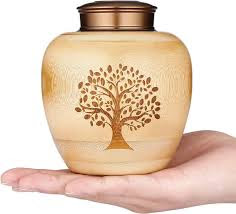Cremation Urns - Urns For Ashes
Cremation has become an increasingly popular option for memorializing loved ones. For those who choose cremation, the question of how to store or display the ashes of the departed is a significant consideration. This is where cremation urns, or urns for ashes, play a vital role. These containers are not only functional but can also serve as beautiful meaningful memorials that reflect the personality, legacy, or preferences of the deceased.
In this article, we will explore what cremation urns are the different types available, and some essential factors to consider when selecting the perfect urn.
What Are Cremation Urns?
Cremation urns are containers designed to hold the cremated remains (often referred to as ashes) of a deceased person. While they are primarily functional, many urns are also aesthetically pleasing allowing them to serve as a lasting tribute to a loved one. Urns can be kept at home placed in columbaria (vaults designed to hold urns), buried, or even used in scattering ceremonies.
Types of Cremation Urns
The variety of urns available allows individuals to find something that suits their taste and the wishes of the deceased. Here are some common types:
Traditional Urns
These are classic urns made from materials such as metal, wood, ceramic, or marble. They come in various sizes, designs, and colors, making it easy to find one that resonates with you or the departed.Keepsake Urns
A keepsake urn is smaller in size, holding only a small portion of the ashes. These are often chosen when families wish to share the ashes among multiple people or keep a small reminder of their loved one close at hand.Biodegradable Urns
Biodegradable urns are designed for environmentally-conscious individuals. Made from materials like paper, salt, or sand, these urns decompose naturally over time. They are an excellent choice for scattering ashes in nature or for burial in a way that returns the remains to the earth in an eco-friendly manner.Companion Urns
Companion urns are designed to hold the ashes of two individuals, usually couples. These larger urns symbolize unity and are often chosen by spouses or partners who wish to be memorialized together.Personalized Urns
Many families opt for personalized urns that can be engraved with the name, dates, or even images of the deceased. This offers a personal touch and a lasting tribute that can be meaningful for the family.Themed Urns
Themed urns reflect the personality hobbies, or interests of the departed. For example, an urn shaped like a football might be chosen for a sports enthusiast, or an urn decorated with musical notes might be fitting for someone who loved music.
Choosing the Right Urn for Ashes
When selecting an urn there are several factors to consider, including the material, design, and size. Here are some important points to keep in mind:
Size of the Urn
The size of the urn depends on the volume of ashes it needs to hold. Typically, one pound of body weight yields about one cubic inch of ashes, so a person weighing 150 pounds would need an urn that can hold at least 150 cubic inches. Smaller keepsake urns may hold only a small portion, while companion urns are designed for two people.Intended Use
Consider where the urn will be placed. If it’s intended for display in your home, aesthetics and durability may be important factors. For burial, a durable material such as metal or stone may be more appropriate. Biodegradable urns are ideal for scattering ceremonies or eco-friendly burials.Material Preferences
Urns come in a wide range of materials, from traditional wood and metal to modern glass and ceramic. The material should complement the desired aesthetic and the environment in which the urn will be kept.Budget
Urns vary in price depending on the material, craftsmanship, and personalization options. Setting a budget beforehand can help narrow down your choices without compromising on quality.Cultural or Religious Considerations
Some religions or cultures have specific customs regarding cremation and the handling of ashes. It's important to ensure that the urn you choose aligns with any religious or cultural traditions.
Caring for Your Cremation Urn
Once you have selected an urn, proper care and maintenance will ensure it remains in good condition. Different materials require different levels of care. For instance, wooden urns should be kept away from moisture, while metal urns may need occasional polishing to maintain their shine. Urns kept outdoors, especially in columbaria or memorial gardens, should be made of durable, weather-resistant materials like granite or bronze.
Conclusion
Cremation urns serve as a final resting place and a personal memorial for loved ones. Choosing the right urn involves considering practical factors like size and material, as well as personal preferences that reflect the character of the deceased. Whether traditional or contemporary, personalized or eco-friendly, the perfect urn provides a lasting tribute and a source of comfort for those left behind.

%20(1).jpeg)


Comments
Post a Comment